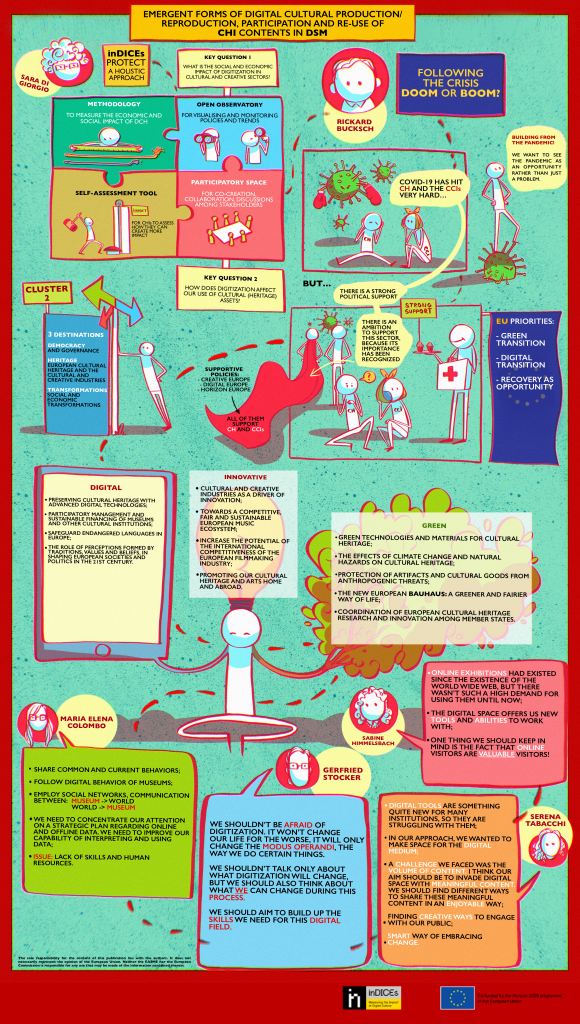Why does the unique contribution that culture can provide, continue to be so overlooked today? especially, why is culture overlooked in the recovery plans of various countries and in other sectors of the Digital Single Market? Culture is not only a matter of entertainment or experience economy, nor merely learning: Culture can be a life-saving resource.
We are sitting on the most important asset of the future: culture in the digital sphere. Connection, co-creation and digital possibilities, boosted by the urgency of this pandemic, have led the cultural institutions to reflect on their strategic role, and the prospects are extremely promising.
The inDICEs’ 2nd Consultation Workshop Digital transitions in the Cultural Heritage Sector, took place on the 20 & 21 of April 2021. During the first day of the workshop, Dr. Pier Luigi Sacco chaired an engaging roundtable session with guest speakers Serena Tabacchi (TATE Modern), Maria Elena Colombo (Accademia delle belle arti di Brera), Gerfried Stocker (Ars Electronica) and Sabine Himmelsbach (HeK Basel). The conversation focused on the contemporary scenario of cultural production after the forced COVID-19 digitization.
Interesting views emerged during the session, agreeing with the need to embrace new awareness in terms of collaborative strategic policies to be developed in a dialogic perspective between the Cultural Heritage Institutions. Panellists also agreed that Cultural Institutions need to cooperate in order to establish a new social contract made available by the digital tools, transgressing the borders of institutional spaces and changing their perspective from gatekeepers to “gate openers”. The Cultural Institutions’ role has to develop towards the curatorial orchestration of the massive contents that coexist and that contaminate each other in the digital environment, by playing an educational part towards active participation and accessibility – instead of understanding education as a mere functional process towards the job market.
In the last year, the common recurrent behaviour that can be observed regarding online dimensions of museums reveals a deep change in communication and a blurry understanding of the world “public/audience”, which traditional definition related to the material realm can not be taken for granted anymore. Given that the digitization’s increasing impact has been predicted since the 2008’s crisis, the current economic logic that underpins the massive cultural content creation online reflects the classic maximization of capital, and digital platforms are mainly focused on stimulating users with “egocasting” (merely imitating classic mainstream media), while true forms of the digital revolution are rather channels of “digital space invasion” that can support collaborative forms of creation.
In this perspective, CHIs need firstly to be supported to embrace the change in the smartest way at a national and European level, in order to fill their gaps in terms of lack of digital and interdisciplinary skills and human resources. Moreover, the role of social facilitators has to be recognized widely by all the public and policymakers, going beyond a meagre audience engagement toward a radical program of capability building and online cultural producers’ entitlement as CHIs’ environment active “citizens”.

Discussing the inDICEs Open Observatory: A hub for cultural heritage institutions digitization – Closed session
The second part of the workshop was a closed session, attended only by invited researchers and artists interested in using the Open Observatory platform for cultural analysis. Guest researchers and artists from Spain, Romania, the Netherlands and Italy participated in the session. The background of the participants was mainly composed of two main areas: researchers from universities and public institutions and artists who collaborate in projects in which research on cultural practices is central. Within these two areas of activity, it was possible to identify three fields of study: 1) the first one regarding the study of cultural audiences and their attitudes; 2) the impact of the digitalization of culture and the specificities of the digital cultural heritage compared to the traditional ones, and 3) the field regarding the impact that digital culture can have on citizens, institutions and sectors of the cultural industry.
As regards to the data used by this group of participants and their specific needs, two specificities emerged: 1)the harmonization of different datasets and data sources in a single platform and 2) the impossibility of having granular data regarding small cultural realities or photographs of digital culture regarding a single sector or country. For this reason, participating researchers said they use a diversity of datasets and sources for the purpose of implementing their research designs. For example, the following sources were cited: Eurostat; EU open consultations; Culturaldata.ro; Egmus; Enumerate surveys; own data, collected through interviews, traditional surveys and digital methods (web mapping).
Finally, regarding the expectations on the platform and the inDICEs project, these can be summarized in three requests made by the group of participants: 1) the first and most important is the accessibility and transparency with respect to datasets and collection processes that must truly reflect open data protocols; 2) the second is to give the tools to analyze these data so that they can be pre-processed by the visualization platform itself; finally, 3) to have granularity and horizontality such as to allow comparison on various national and regional levels and between cities and cultural institutions. The comments and suggestions are being considered as key feedback and will be considered for the next steps in the development of the Open Observatory and its components.
Read the main insights of the closed session in our blogpost on the Digitisation and Digital Transformation in the Cultural Heritage Sector: Perspectives of Different Communities
Would you like to contribute to the development of the Open Observatory Platform and its components? Join our Open Call for open sources on culture! Anyone can participate by indicating 1 to 5 websites that contain data and information on cultural themes and trends and digitized cultural contents. By joining the call, the Visual Analytics Dashboard and the Observatory Platform will be nourished not only by top-down sources selected by experts but also by a bottom-up process of co-creation.
Share this content: